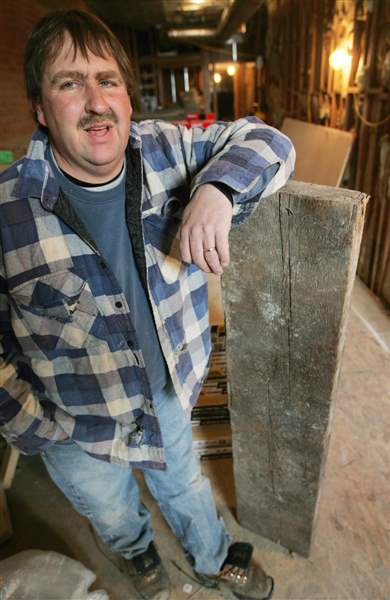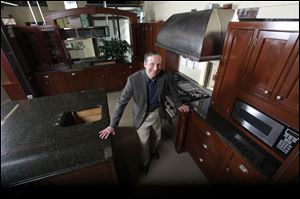
Renovators save money, keep materials out of landfills
Salvaged materials live on in remodels
4/24/2011
Project Supervisor Ben Gulick leans on the last of the wooden flooring joists that were removed from 303 1st Street in Hoboken, N.J., for a construction project in Morris County.
(Hackensack, N.J.) Record

Steve Feldman shows off some of the high-end salvaged kitchen cabinets and appliances he sells at his showroom in Riverdale, N.J.
HACKENSACK, N.J. -- Renovating? You could rip up the room and haul everything into the trash.
But a growing number of homeowners, architects, and builders are trying to reuse or recycle construction materials whenever possible -- for reasons both environmental and aesthetic.
Architect Anthony Garrett went this route with the gut renovation of a Hoboken, N.J., building.
Its wooden floor joists, more than a century old, were salvaged and trucked to Montville Township, N.J., to be reused as flooring and exposed beams in a mixed-use development.
"It's dismantling, as opposed to demolition," he said.
With construction waste making up as much as 25 percent to 50 percent of the junk in landfills, the push to salvage building materials is "gaining a huge amount of momentum," said Anne Nicklin, executive director of the Building Materials Reuse Association, an Oregon-based trade group.
"You can't buy old-growth timber at Home Depot, but you can find it in a building that's coming down," she said.
A number of nonprofit retail outlets offer a marketplace for old building materials.

Project Supervisor Ben Gulick leans on the last of the wooden flooring joists that were removed from 303 1st Street in Hoboken, N.J., for a construction project in Morris County.
They include Habitat for Humanity's ReStore and Connecticut-based Green Demolitions, which targets affluent homeowners who want to change their kitchens but who feel guilty about dumping cabinets and appliances that are sometimes only a few years old.
It might be hard to believe that homeowners would replace kitchens that are in good shape, but "they want the kitchen they want," said Steve Feldman, founder of Green Demolitions.
His pitch: By donating the old kitchen to his company, homeowners can save the disposal costs, plus get a tax deduction because Green Demolitions' profits go to support addiction treatment programs.
Green Demolitions sold 600 kitchens last year in its three stores; most were donated by homeowners, but about 100 were store displays donated by kitchen remodeling contractors.
Stephanie and Vincent Gurnari of Oakland, N.J., visited a Green Demolitions store recently, looking for a few cabinets to add to their existing kitchen, but spotted a full kitchen -- including appliances -- for just under $6,000.
"We just kind of jumped on the opportunity," Ms. Gurnari said. "We've got champagne tastes, and we wouldn't have been able to get some of the features we got with the budget we had."
Because reusing materials requires careful deconstruction of a room or building, it is usually more time-consuming and can be more expensive than simple demolition.
But it also doesn't create the clouds of dust -- potentially laden with asbestos or lead paint -- created by demolition, Ms. Nicklin pointed out.
Carlos Alcala and his wife, Vicki, recently had their house taken down to the foundation and rebuilt.
They reused much of the wood and brick.
The original cypress wood paneling and some of the flooring weren't needed in the new design, but were salvaged and resold, helping to offset the costs of the project.
But saving money was only part of the equation.
The Alcalas said they think reused brick is more attractive, and it preserves some of the house's history.
"When it makes sense, especially from an economic perspective, there's no reason why you shouldn't reuse materials," Mr. Alcala said.